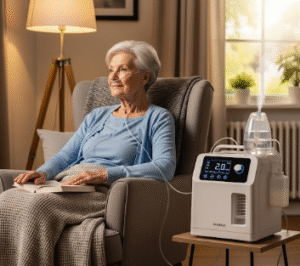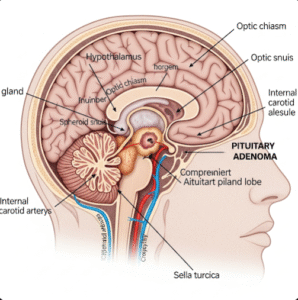Overview
Polydipsia refers to excessive or abnormally intense thirst, often accompanied by the need to drink large amounts of fluids. While everyone feels thirsty occasionally, polydipsia is different from normal thirst—it is persistent, difficult to quench, and may be associated with underlying medical conditions. It is one of the classic warning signs of diabetes mellitus and diabetes insipidus, but it can also appear in other endocrine, psychological, and systemic conditions.
In clinical terms, polydipsia is defined as fluid intake exceeding 3 liters per day in adults. This condition is not only uncomfortable but may also signal serious health issues requiring medical attention. Korean hospitals and clinics specialize in advanced diagnostic tests and treatments that can identify the cause of polydipsia and provide personalized care.
➤ Polydipsia is more than just being thirsty; it is often a medical symptom.
➤ Diabetes mellitus and diabetes insipidus are the two most common underlying conditions.
➤ Excessive water intake without cause may indicate psychogenic polydipsia.
Key Facts
➤ Polydipsia is defined as persistent, excessive thirst with increased fluid intake.
➤ Often associated with polyuria (frequent urination) and polyphagia (increased hunger) in diabetes mellitus.
➤ May be caused by high blood sugar, hormonal imbalances, or psychological disorders.
➤ Untreated polydipsia can lead to electrolyte imbalances and dehydration risks.
➤ Diagnosis in Korea includes blood sugar monitoring, urine analysis, and hormone studies.
What is Polydipsia?
Polydipsia is the medical term for excessive thirst, where a person feels compelled to drink unusually large amounts of fluids. This condition is usually a symptom rather than a disease itself.
In healthy individuals, thirst is regulated by the brain’s hypothalamus, which detects changes in fluid balance and blood concentration. In polydipsia, this system is disrupted by metabolic, hormonal, or psychological factors.
➤ Normal thirst vs. Polydipsia:
➤ Normal thirst resolves after drinking a moderate amount of water.
➤ Polydipsia persists even after consuming large quantities of fluid.
➤ Primary conditions linked to polydipsia:
➤ Diabetes mellitus – high blood sugar levels trigger excessive thirst.
➤ Diabetes insipidus – kidney’s inability to conserve water leads to dehydration and thirst.
➤ Psychogenic polydipsia – compulsive drinking, often associated with psychiatric illness.
What Symptoms Are Related To
Polydipsia rarely occurs alone and is often associated with additional symptoms:
➤ Diabetes-related symptoms:
➤ Frequent urination (polyuria).
➤ Excessive hunger (polyphagia).
➤ Unexplained weight loss.
➤ Fatigue and blurred vision.
➤ Electrolyte imbalance symptoms:
➤ Headaches, confusion, or irritability.
➤ Muscle cramps or weakness.
➤ Nausea and vomiting in severe cases.
➤ Psychological symptoms (in psychogenic polydipsia):
➤ Anxiety, compulsive behavior, or stress-related drinking.
Recognizing these related symptoms helps doctors differentiate between physical and psychological causes of polydipsia.
What Causes / Possible Causes
The causes of polydipsia vary widely and include endocrine, renal, and psychiatric factors:
➤ Diabetes mellitus (Type 1 & Type 2):
➤ High blood sugar increases urination, leading to dehydration and excessive thirst.
➤ Diabetes insipidus:
➤ A condition where the kidneys cannot conserve water, leading to large urine output and constant thirst.
➤ Can be central (caused by pituitary gland dysfunction) or nephrogenic (caused by kidney resistance to antidiuretic hormone).
➤ Psychogenic polydipsia:
➤ A psychological condition where individuals compulsively drink excessive amounts of water.
➤ Often associated with psychiatric illnesses like schizophrenia.
➤ Other possible causes:
➤ High salt intake or dehydration.
➤ Medications such as diuretics.
➤ Kidney disorders.
➤ Hormonal imbalances affecting the hypothalamus or pituitary gland.
When Should I See My Doctor
You should consult a doctor if:
➤ Excessive thirst persists for more than a few days, even with adequate hydration.
➤ Polydipsia is accompanied by polyuria, fatigue, or unexplained weight loss (possible diabetes).
➤ You experience confusion, seizures, or disorientation, which may indicate severe electrolyte imbalance.
➤ Children show unusual thirst and frequent urination, as it may be an early sign of type 1 diabetes.
➤ You have psychiatric symptoms with excessive drinking, suggesting psychogenic polydipsia.
Prompt evaluation ensures that underlying health problems are detected early and managed effectively.
Care and Treatment
Treatment of polydipsia depends on the underlying cause. Management generally includes lifestyle modifications, medications, and in some cases, specialized therapies.
➤ Diabetes mellitus management:
➤ Blood sugar control through insulin therapy (Type 1) or oral hypoglycemic drugs (Type 2).
➤ Dietary changes and regular exercise.
➤ Continuous glucose monitoring.
➤ Diabetes insipidus management:
➤ Central DI: Desmopressin (synthetic ADH) to reduce excessive urination.
➤ Nephrogenic DI: Low-salt diet, increased water intake, and diuretics like thiazides.
➤ Psychogenic polydipsia management:
➤ Psychiatric evaluation and therapy.
➤ Behavioral modifications and counseling.
➤ Medications for underlying psychiatric conditions if necessary.
➤ Supportive care:
➤ Adequate hydration with electrolyte-balanced fluids.
➤ Monitoring of blood sodium and potassium levels.
➤ Education on safe fluid intake to prevent water intoxication.
Treatment Options in Korea
Korea offers world-class medical facilities and treatment options for patients experiencing polydipsia. Care typically includes:
➤ Comprehensive diagnostic work-up – blood glucose tests, urine analysis, hormone testing, and imaging studies of the pituitary gland.
➤ Diabetes care programs – advanced insulin therapy, dietary counseling, and lifestyle support.
➤ Specialized endocrine clinics – for managing diabetes insipidus and complex hormonal disorders.
➤ Psychiatric services – for patients with psychogenic polydipsia, including therapy and support programs.
➤ Renal care centers – focused on kidney-related causes of polydipsia.
➤ Patient-centered monitoring – tailored hydration plans, continuous glucose monitoring devices, and regular follow-up.
Korean hospitals emphasize multidisciplinary treatment, combining endocrinology, psychiatry, and nephrology for a complete approach to polydipsia. Patients benefit from cutting-edge technology, highly trained specialists, and holistic care systems.













